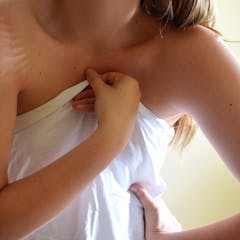
Articles sur Melanoma
Affichage de 41 à 60 de 61 articles

Most of the skin lumps we develop will be benign. Here are some of the most common, and how to tell them apart.

A few cancers vanish without any medical treatment. Researchers are studying these ‘spontaneous regressions’ to see if they can lead to new cancer treatments.

With an estimated 100,000 health and fitness apps available, it seems there is an app for everything – from tracking your bowel movements to practising your pimple-popping technique.

Skin cancer – which is preventable – costs the South African health system more than is necessary.

A recent study claims most people with melanoma don’t have many moles or any atypical moles. But exploring the study in depth shows these conclusions don’t have a strong foundation.

Researchers have estimated that 8% of the five million cases of skin cancer diagnosed each year in the US can be attributed to indoor tanning.

Keytruda® is the latest drug to be registered in Australia for the treatment of widespread melanoma. But we must wait to see if it meets the cost-effectiveness targets for PBS subsidisation.

Around 30 Australians are diagnosed with melanoma every day and more than 1,200 die from the disease each year. While small amounts of ultraviolet (UV) radiation are required for the production of vitamin…

The earlier you find a cancerous mole, the easier the treatment and the better the outcomes. But it’s not easy distinguishing between harmless, benign moles and those that warrant further attention. In…
The prevalence of itches and pain in patients with skin cancer can help clinicians identify which of these cancers are melanoma…
Growth states of cancer cells can now be visualised in real time, thanks to a new 3D model of a melanoma tumour developed…
The way melanoma cells manage tangled DNA could explain why they rapidly develop resistance to cancer treatment. Researchers…

Europeans fall prey to skin cancer because of their lighter skin, while Africans’ dark skin protects them. But East Asians, whose skin colour resembles that of Europeans, are similar to Africans in their…
A gene mutation responsible for red hair and pale skin is also attributed to risk of melanoma. An international study found…

Melanomas may be less common than other skin cancers but their ability to become malignant and spread to other parts of the body makes them some of the deadliest if not caught early. More than 10,000 people…

Women who use aspirin for five or more years have a 30% lower risk of developing melanoma skin cancer than women who don’t take aspirin, a new study has found. Previous studies have linked aspirin with…
A gene known to have a strong connection to obesity and other weight-related health issues has been shown to also increase…

With the long, hot Australian summer comes the imperative to manage the country’s enormous skin cancer risk. Along with the growing raw numbers (11,545 skin cancer cases diagnosed in 2009) and rates of…

Smartphone applications designed to help people work out if they have a melanoma are potentially harmful, getting it wrong in up to 30% of cases, according to a new study from the University of Pittsburgh…

A study that suggests vitamin A could reduce the risk of melanoma should be treated with caution, according to Australian cancer experts who say the results are inconclusive and involve potentially toxic…
